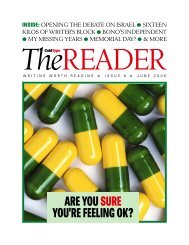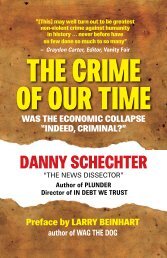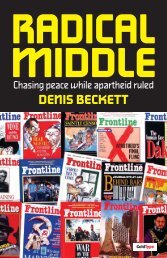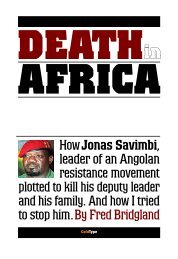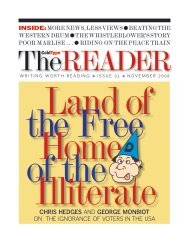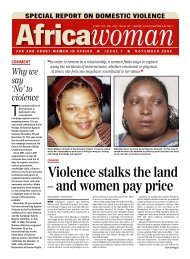UPDATED - ColdType
UPDATED - ColdType
UPDATED - ColdType
- TAGS
- updated
- coldtype
- coldtype.net
Create successful ePaper yourself
Turn your PDF publications into a flip-book with our unique Google optimized e-Paper software.
REMEMBERING THE FALLEN<br />
SOME FACTS FROM FAIR (Fairness and Accuracy in Reporting)<br />
AMPLIFYING OFFICIALS,<br />
SQUELCHING DISSENT<br />
uring the Iraq war, the guest lists of<br />
major nightly newscasts were dominated<br />
by government and military officials,<br />
disproportionately favored prowar<br />
voices and marginalized dissenters,<br />
a new study by FAIR has found.<br />
Starting the day after the invasion of Iraq<br />
began, the three-week study covered the most<br />
intense weeks of the war (March 20 to April 9,<br />
2003). It examined 1,617 on-camera sources in<br />
stories about Iraq on six major evening newscasts:<br />
ABC World News Tonight, CBS Evening<br />
News, NBC Nightly News, CNN’s Wolf Blitzer<br />
Reports, Fox News Channel’s Special Report with<br />
Brit Hume and PBS’s NewsHour With Jim Lehrer.<br />
Some key findings:<br />
■ Official voices dominate: 63 percent of all<br />
sources were current or former government<br />
employees. U.S. officials alone accounted for<br />
more than half (52 percent) of all sources.<br />
■ Pro-war chorus: Nearly two thirds of all<br />
sources – 64 percent – were pro-war.<br />
■ Anti-war voices missing: At a time when 27<br />
percent of the U.S. public opposed the war, only<br />
10 percent of all sources, and just 3 percent of<br />
U.S. sources, were anti-war. That means the percentage<br />
of Americans opposing the war was<br />
nearly 10 times higher in the real world than on<br />
237<br />
the news.<br />
■ Sound bytes vs. interviews: When anti-war<br />
guests did make the news, they were mostly relegated<br />
to man-on-the-street sound bytes. Not a<br />
single show did a sit-down interview with a person<br />
identified as being against the war.<br />
■ International perspectives scarce: Only 6<br />
percent of sources came from countries other<br />
than the U.S., Britain or Iraq. Citizens of France,<br />
Germany and Russia – countries most opposed<br />
to war – constituted just 1 percent of all guests.<br />
The six shows’ guest lists had a lot in common,<br />
but there were a few differences. Of U.S. sources,<br />
NBC Nightly News had the smallest percentage<br />
of officials (60 percent) and the largest percentage<br />
of anti-war guests (4 percent), while CBS<br />
Evening News had the highest percentage of officials<br />
(75 percent) and fewest anti-war voices (a<br />
single sound byte from Michael Moore’s Oscar<br />
acceptance speech).<br />
“When independent policy critics and grassroots<br />
voices are shortchanged, democracy is<br />
shortchanged,” said FAIR’s Steve Rendall. “Not<br />
one show offered proportionate coverage of antiwar<br />
sentiment. If media are supposed to foster<br />
vigorous, inclusive debate during national crises,<br />
it’s clear that during the Iraq war, TV news let the<br />
public down.” ●




